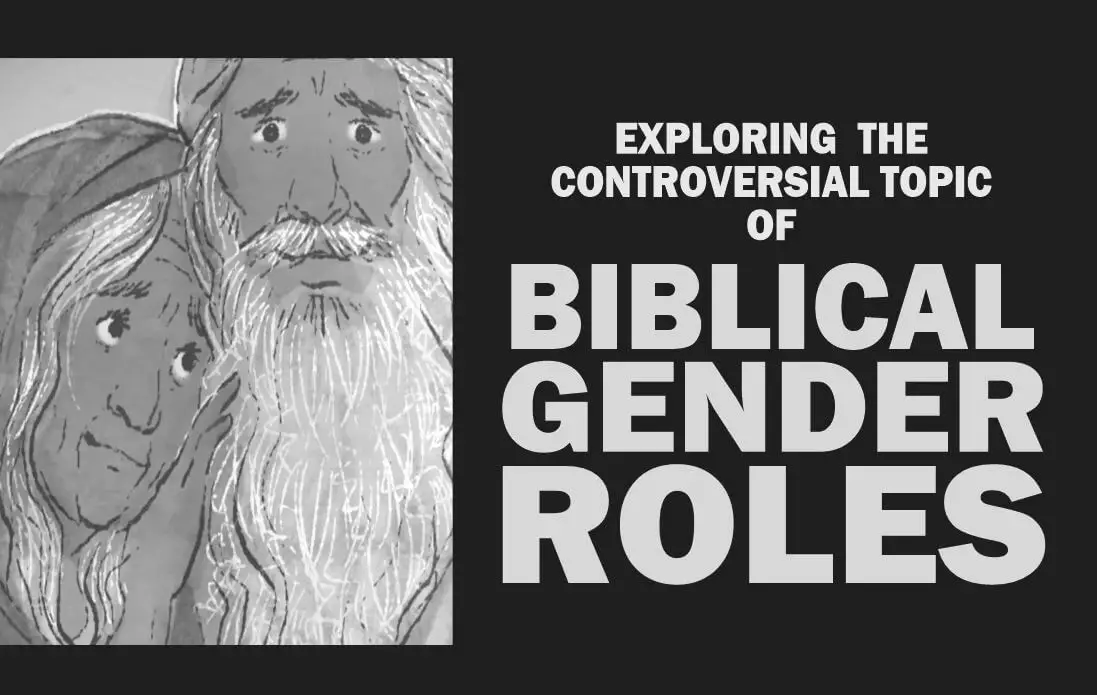Last updated on December 1st, 2023 at 08:23 am
Explore the intriguing biblical gender roles and unravel the controversies, debunk misconceptions, and discover enlightening examples for clarity.
In the realm of religious and social discourse, few topics ignite as much passion and controversy as biblical gender roles and expectations.
The subject of how men and women should behave and interact according to scriptural teachings has been a source of intense debate for centuries.
Some staunchly adhere to traditional interpretations, arguing for distinct and complementary roles based on divine design.
Others advocate for a more progressive understanding, challenging traditional hierarchies and emphasizing gender equality.
This blog post embarks on a journey through the intricate landscape of biblical gender dynamics, aiming to shed light on the contentious issues, interpretations, and debates surrounding this topic.
Table of Contents
- Definition of Biblical Gender Roles
- Biblical Foundations and References
- The Role of Men in Biblical Gender Roles
- Examples Of Biblical Male Figures and Their Roles
- Modern Challenges and Misconceptions of Biblical Gender Roles of Men
- The Role of Women in Biblical Gender Roles
- Examples of Biblical Female Figures and Their Roles
- Modern Challenges and Misconceptions of Biblical Gender Roles of Women
- Controversial Issues and Debates on Scriptural Gender Expectations
- LGBTQ+ Perspectives and Biblical Gender Roles
- Alternative Interpretations on Biblical Gender Expectations
- The Importance of Context and Cultural Considerations on Biblical Gender Expectations
- Challenges and Criticisms of Scriptural Expectations of Men and Women
- Personal Reflections and Practical Application on Biblical Expectations of Men and Women
- Biblical Gender Roles in Marriage
Related: The Origins Of Gender Stereotypes Through The Ages
Definition of Biblical Gender Roles
Biblical gender roles are the prescribed roles, responsibilities, and behaviors that are outlined in the Bible for men and women.
These roles are believed by many religious individuals and communities to be divinely ordained and reflective of God’s intended design for humanity.
The concept of biblical gender dynamics is based on the belief that men and women have distinct roles and functions that are complementary to one another.
Related: Balancing Biblical Gender Roles In Modern Society
In traditional interpretations, the roles of men and women often depict men as leaders, providers, and protectors, while women are seen as nurturers, caregivers, and submissive to male authority.
These roles are often associated with the institution of marriage and family, as well as leadership positions within religious communities.
It is important to note that interpretations of biblical gender roles can vary among different religious groups and individuals, and contemporary perspectives on gender roles continue to evolve and diversify within religious communities.
Biblical Foundations and References
When discussing gender roles from the eye of the bible, it is crucial to establish the foundational texts and references that inform our understanding.
These include passages from the Bible that explicitly address the roles and responsibilities of men and women.
Examples of such passages include Genesis 1:27. This passage states that God created humans male and female, and various verses in the New Testament that speak about the relationships between husbands and wives, such as Ephesians 5:22-33 and Colossians 3:18-19.
Ephesians 5:22-33 speaks about the submission of wives to their husbands and the love and leadership of husbands towards their wives.
Another frequently referenced passage is 1 Timothy 2:12, which states that women should not have authority over men in the context of teaching or exercising authority.
Additionally, biblical figures and narratives provide insights into gender roles.
Examples of influential biblical figures include Adam and Eve, Abraham and Sarah, and Deborah.
Their stories offer glimpses into traditional gender roles as well as instances where women played significant leadership roles.
Related: Understanding Gender Roles and Expectations in Society
Different Interpretations and Perspectives
Given the complexity of biblical texts and their potential for interpretation, it is no surprise that diverse perspectives exist regarding this subject.
Some interpretations advocate for complementarianism, positing that men and women have distinct but complementary roles.
This perspective often emphasizes male leadership and female submission within the family, the church, and society.
Conversely, other interpretations support egalitarianism, arguing for equal opportunities and responsibilities for both genders.
Egalitarians challenge hierarchical structures and advocate for shared decision-making and leadership positions, believing that gender should not limit one’s abilities or opportunities.
Furthermore, cultural and contextual factors contribute to differing perspectives.
Cultural norms, historical context, and the social dynamics of the time in which biblical texts were written all shape how individuals interpret and apply gender roles today.
These variations in interpretation and perspective contribute to the ongoing debates and controversies surrounding biblical gender roles.
The Role of Men in Biblical Gender Roles
Within the realm of biblical teachings, the roles and responsibilities assigned to men carry significant weight and offer valuable insights into their purpose and place in society.
The Bible presents a rich narrative, principles, and guidelines that define the male role.
Understanding these roles and responsibilities is essential for individuals seeking to align their lives with biblical teachings and values.
In this section, we will explore the diverse dimensions of biblical male roles and responsibilities.
From the ancient narratives of patriarchs and prophets to the teachings of Jesus and the apostles, we will unravel the core principles that underpin the biblical understanding of what it means to be a man (masculinity).
By examining the biblical foundations, exploring the examples of influential male figures, and addressing modern challenges and misconceptions, we aim to provide a comprehensive perspective on biblical male roles and responsibilities.
Here are Biblical male roles and responsibilities:
1. Protector

In the Bible, men were often seen as the primary protectors in various aspects of life. They are called to protect their families, communities, and the vulnerable.
This includes defending against harm, injustice, and providing for others. The role of a male protector is a significant aspect of biblical gender roles, encompassing physical, emotional, and spiritual protection.
Here are instances where men are protectors:
Family: Men are often seen as the primary protectors in families. The Bible emphasizes this role, calling husbands to sacrificially love and provide for their wives. Fathers are encouraged to raise their children in the ways of the Lord, protecting them and instilling moral values. The story of Adam and Eve illustrates this responsibility, as Adam failed to protect Eve from temptation. The apostle Paul also urges men to care for their families, comparing it to Christ’s love for the church.
Related: Embracing Femininity To Feel Confident And Beautiful
Society: Men are seen as protectors in society, responsible for defending justice, upholding righteousness, and advocating for the vulnerable. Biblical examples like judges, kings, and prophets demonstrate this aspect of male leadership. Men are often depicted as warriors and defenders, protecting their families and communities from external threats. David’s story exemplifies this, as he bravely defeated Goliath and protected his people.
Spiritual: Men are called to be spiritual protectors, defending the faith and guiding others. This role may stem from the patriarchal structure of biblical times. However, the Bible also recognizes women who protected their communities, like Deborah, a prophetess and judge. Thus, while predominantly male, the role of protector is not exclusive to men.
Related: Reconciling Feminism And Biblical Gender Roles
2. Provider

In the biblical context, the role of a “provider” is often associated with men and is considered a distinct gender role for males.
The Bible presents various teachings and examples that emphasize the responsibility of men to provide for their families and communities.
Family: Men are depicted as the primary providers within the family unit. They are called to work diligently and responsibly to meet the material needs of their households. This includes providing food, shelter, and other necessities. The biblical narrative portrays this role through examples like Adam, who was tasked with working the land to provide for himself and his family.
Marriage: Within the context of marriage, men are expected to provide not only materially but also emotionally and spiritually. They are called to love their wives sacrificially, supporting and caring for them in all aspects of life. This includes offering guidance, encouragement, and companionship. The biblical teachings highlight the husband’s role as the head of the household, responsible for the overall well-being of the family.
Community: Men are also encouraged to extend their provision beyond the family unit to the wider community. This can involve supporting the less fortunate, contributing to the welfare of others, and being generous in their resources and time. The biblical examples of figures like Joseph, who provided for his family and the entire nation during a time of famine, illustrate the importance of providing for the broader community.
3. Leader

Leadership is a distinct gender role of males. Men are called to be leaders in their communities, churches, and families.
This does not mean dominating or controlling others, but rather serving with humility and setting a good example for others to follow.
Throughout the Bible, there are various passages and narratives that highlight the responsibility of men to lead in different spheres of life.
Family: Men are portrayed as the leaders within the family unit. They are called to lead with wisdom, humility, and love. This leadership role involves making decisions in consultation with their spouses, providing guidance and direction for their children, and setting an example of faithfulness and obedience to God. The biblical teachings emphasize the husband’s role as the head of the household, responsible for the spiritual and moral well-being of the family.
Church: In the context of the church, men are often depicted as leaders in positions of authority, such as pastors, elders, and deacons. They are called to lead the congregation, shepherd the flock, and teach sound doctrine. This leadership role involves serving and equipping others for ministry, promoting unity, and exercising spiritual discernment.
Society: Men are also portrayed as leaders within society, called to make a positive impact and contribute to the welfare of their communities. This can involve taking up leadership positions in government, business, or community organizations, and using their influence and resources for the betterment of society. The biblical examples of leaders like Moses, David, and Nehemiah demonstrate the qualities of servant leadership, courage, and dedication to the well-being of the people.
4. Husband

Men are called to be faithful and loving husbands to their wives, treating them with kindness, respect, and tenderness.
They are to love their wives as Christ loved the church and be willing to make sacrifices for their happiness and well-being.
Love and Sacrifice: The Bible calls husbands to love their wives sacrificially, mirroring the love of Christ for the church. This love is characterized by selflessness, compassion, and putting the needs and well-being of their wives above their own. Husbands are encouraged to nurture and cherish their wives, providing emotional support, care, and affirmation.
Leadership and Headship: Within the marital relationship, husbands are called to assume the role of leadership and headship. This does not imply superiority or dominance, but rather a responsibility to lead with humility, wisdom, and servant-heartedness. Husbands are expected to provide guidance, make decisions in consultation with their wives, and take spiritual and moral leadership in the family.
Mutual Submission: While husbands are called to lead, the Bible also emphasizes mutual submission within marriage. Husbands and wives are instructed to submit to one another out of reverence for Christ. This mutual submission involves respecting and honoring each other’s opinions, needs, and contributions.
Related: Building A Strong Family: How To Be A Real Man At Home
Father: Men are called to be nurturing and responsible fathers, raising their children in the ways of God and training them to be responsible, productive members of society. They are to impart God’s values and wisdom to their children and provide a stable, loving home environment.
Love and Nurturing: Fathers are called to love their children unconditionally and provide a nurturing environment. The biblical depiction of a father’s love reflects the love of God, demonstrating care, support, and encouragement. Fathers are encouraged to actively participate in the lives of their children, fostering emotional connection and providing a sense of security.
Teaching and Discipline: Fathers are tasked with instructing their children in wisdom, values, and moral principles. They are called to be teachers and guides, imparting knowledge, skills, and life lessons. Discipline, when done in love and with proper guidance, plays a role in shaping a child’s character, instilling discipline, and teaching them right from wrong.
Spiritual Guidance: Fathers have a vital role in the spiritual development of their children. They are called to lead by example, teaching their children about God, His Word, and the ways of righteousness. Fathers are encouraged to create an environment where faith is nurtured, prayer is practiced, and spiritual growth is fostered.
Examples Of Biblical Male Figures and Their Roles
Examining the lives of biblical male figures offers a deeper understanding.
King David showcases courage, leadership, and poetic expression. Joseph demonstrates integrity and resilience in adversity.
There are numerous examples of biblical male figures who played significant roles in various contexts. Here are a few notable examples:
- Abraham: Abraham exemplifies faithfulness and obedience as he led his family and followed God’s instructions. Known as the father of many nations, Abraham is a prominent figure in the Bible. He exemplified faith and obedience to God and was chosen to be the ancestor of the Israelite people. His role as a faithful servant and patriarch showcased his leadership and trust in God’s promises.
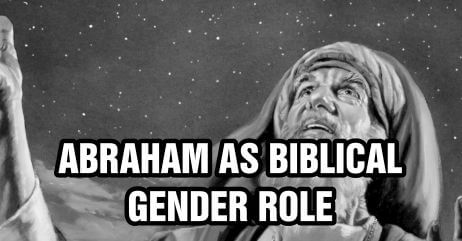
- Moses: Moses played a pivotal role in leading the Israelites out of slavery in Egypt. He served as a prophet, lawgiver, and mediator between God and the people. His leadership was marked by courage, humility, and dependence on God, as he guided the Israelites through the wilderness toward the Promised Land.
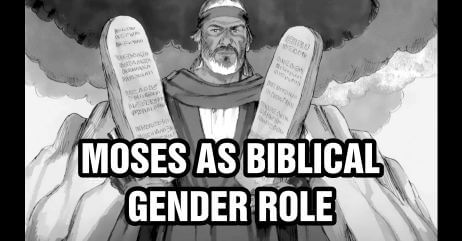
- David: David, anointed as the king of Israel, is known for his leadership and prowess as a warrior. He defeated the giant Goliath, united the nation, and established Jerusalem as the capital. David’s role as a king and psalmist highlighted his devotion to God and his ability to inspire others through his words and actions.
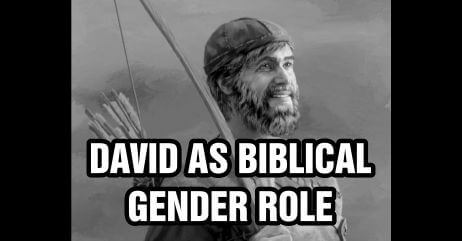
- Joseph: Joseph, the son of Jacob, demonstrated leadership and wisdom as he rose from being sold into slavery to becoming a powerful figure in Egypt. His ability to interpret dreams and administer Pharaoh’s kingdom showcased his administrative skills and his role in preserving the nation during a time of famine.
- Jesus: The ultimate example of masculinity and leadership in the Bible is Jesus Christ. As the Son of God, Jesus came to earth to fulfill the role of the Savior. His teachings, miracles, and sacrificial death on the cross exemplify servant leadership, love, compassion, and redemption.
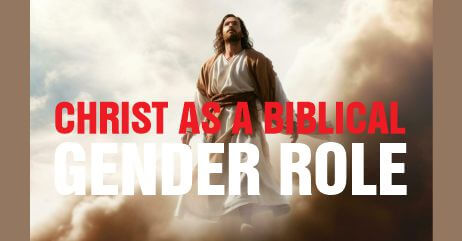
These examples provide valuable lessons on the responsibilities and character traits expected of men in biblical narratives.
Related: Femininity And Sexuality: Navigating Society’s Expectations
Modern Challenges and Misconceptions of Biblical Gender Roles of Men
Contemporary society poses challenges and misconceptions regarding biblical gender expectations for men.
Some argue that these roles perpetuate inequality and restrict personal expression.
However, it is crucial to differentiate between biblical principles and cultural interpretations.
Misconceptions may arise when certain passages are taken out of context or selectively emphasize
Here are some of the key issues regarding the challenges and misconceptions of Biblical gender expectations of men:
1. Toxic Masculinity: One prevalent challenge is the association of biblical gender roles with harmful masculinity. Some argue that the traditional understanding of male roles reinforces harmful behaviours such as aggression, dominance, and emotional suppression. It is important to separate toxic masculinity from the biblical call for men to demonstrate qualities such as love, humility, and sacrificial leadership.
2. Role Rejection: Another challenge is the rejection of traditional male roles altogether. Some individuals question the relevance of biblical gender expectations in today’s society, advocating for a more egalitarian approach where gender differences are downplayed or ignored. This can lead to a disregard for the unique contributions and responsibilities that men can bring to relationships, families, and communities.
3. Stereotyping and Narrow Expectations: There is a risk of stereotyping and imposing narrow expectations on men based on traditional gender roles. This can limit their individuality, personal aspirations, and emotional expression. It is important to recognize that men have diverse talents, interests, and strengths, and their roles should not be confined to limited societal expectations.
4. Balancing Work and Family: Modern expectations of work and family life can create challenges for men in fulfilling their gender expectations. Balancing career aspirations with family responsibilities can be demanding and may require intentional efforts to prioritize and find a healthy equilibrium.
5. Role Confusion: Men may experience confusion and uncertainty in defining their roles in a rapidly changing society. The evolving definitions of masculinity and shifting cultural norms can make it challenging for men to navigate their identity and responsibilities in light of biblical teachings.
The Role of Women in Biblical Gender Roles
In the discussion of biblical gender dynamics, it is essential to explore the significant role women play within this framework.
The Bible presents a rich collection of women who exemplify faith, wisdom, and strength.
Understanding the biblical depiction of female roles and addressing modern challenges and misconceptions can help women embrace their God-given identity and purpose.
Biblical Depiction of Female Roles and Responsibilities
The Biblical gender expectation depiction of females is as follows:
1. Partners and Helpers: In the biblical context, females are depicted as partners and helpers alongside males. This understanding of gender roles emphasizes the complementary nature of men and women, highlighting their equal value and dignity. The concept of being a partner and helper is rooted in the creation account in Genesis, where God created Eve as a suitable companion for Adam. As a partner, women are called to walk alongside men, supporting and collaborating with them in various aspects of life. As a helper, women are entrusted with the responsibility to provide assistance, encouragement, and support to their male counterparts.

2. Nurturers and Caregivers: In the biblical context, females are often depicted as nurturers and caregivers, embracing roles that involve caring for and nurturing others. This portrayal recognizes the unique capacity of women to provide love, support, and care within the family and broader community.
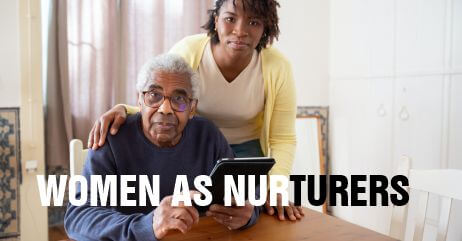
Related: The Impact of Masculinity On Society: Embracing Diversity And Inclusion
Examples of Biblical Female Figures and Their Roles
- Eve: The first woman created by God, Eve represented the foundational role of being a partner and helper to Adam.
- Sarah: Known for her unwavering faith, Sarah exemplified the role of a supportive wife and mother, playing a vital part in the fulfillment of God’s promises.
- Deborah: As a prophetess and judge, Deborah displayed exceptional leadership, courage, and discernment in guiding the nation of Israel.
- Ruth: Known for her loyalty and faithfulness, Ruth demonstrated the role of a devoted daughter-in-law, caregiver, and provider.
Modern Challenges and Misconceptions of Biblical Gender Roles of Women
The biblical gender roles of women have faced various challenges and misconceptions in modern times.
Let’s explore some of these issues:
1. Misconception of Subjugation: One common misconception is that biblical gender expectations promote the subjugation and inferiority of women. However, it is important to interpret biblical teachings in their cultural and historical context, understanding that the Bible upholds the equal value and worth of both men and women.
2. Limiting Traditional Roles: Another challenge is the perception that biblical gender roles confine women to traditional roles, such as homemaking and child-rearing while disregarding their potential in other areas of life. This misconception fails to recognize the diversity of gifts, talents, and callings that women possess.
3. Career and Leadership Opportunities: Women may face challenges in pursuing career aspirations and leadership positions within religious or societal contexts that place limitations on their roles. This can create tension between societal expectations and the desire to live out one’s calling.
4. Balancing Multiple Roles: Women often encounter the challenge of balancing multiple roles and responsibilities, such as career, family, and personal pursuits. Juggling these demands can be overwhelming and may require intentional choices, support systems, and flexibility.
5. Cultural Influences: Cultural norms and societal pressures can shape misconceptions about the roles and worth of women, leading to a divergence from biblical principles. These influences can perpetuate stereotypes, inequality, and limited opportunities for women.
Controversial Issues and Debates on Scriptural Gender Expectations
Discussions on biblical gender roles are complex and sensitive, encompassing topics like submission, authority, leadership, LGBTQ+ perspectives, and societal roles.
By exploring these subtopics, we aim to foster understanding and respectful dialogue on this multifaceted subject.
1. Submission and Authority within Marriage: The concept of submission and authority within marriage is a topic that elicits differing viewpoints. Some interpret biblical teachings as advocating for a hierarchical structure, where the husband holds authority and the wife is called to submit. Engaging in open and respectful discussions can help navigate these differing interpretations and encourage healthy relationships based on love, mutual respect, and partnership.
2. Leadership Roles in Religious Institutions: Religious institutions have been a focal point of discussions on gender roles, particularly in leadership positions. Traditional interpretations have often restricted leadership roles to men, citing scriptural passages that mention male leaders. However, an increasing number of individuals advocate for expanded opportunities for women in ministry and leadership roles, emphasizing equality and recognizing the gifts and calling of both genders.
Related: A Peek Into The Inner Lives Of Women
3. Gender Roles in Society and the Workplace: The influence of biblical gender expectations extends beyond the confines of family and religious institutions, impacting societal and workplace dynamics. Discussions revolve around issues such as the division of labour, gender stereotypes, and opportunities for women in various professions.
LGBTQ+ Perspectives and Biblical Gender Roles
The controversy surrounding LGBTQ+ perspectives and biblical gender dynamics arises from the collision of deeply held religious beliefs, diverse understandings of human sexuality, and evolving societal attitudes.
Here are some key factors contributing to the controversy:
- Scriptural Interpretation: Differing interpretations of biblical passages related to gender and sexuality lead to conflicts. Some view them as condemning same-sex relationships or non-binary gender identities, while others advocate for inclusive and affirming interpretations emphasizing love, acceptance, and the worth of all individuals.
- Theological and Cultural Traditions: Religious traditions and cultural contexts influence how LGBTQ+ issues are addressed within faith communities. Conservative traditions tend to adhere to traditional interpretations of gender roles and view homosexuality as sinful, while more progressive traditions strive for inclusivity and recognize diverse expressions of love and identity.
- Personal and Community Experiences: LGBTQ+ individuals and their families often face unique challenges within religious communities. Conflicts arise when personal experiences and identities collide with established religious teachings, leading to feelings of exclusion, discrimination, and emotional distress.
- Evolving Societal Attitudes: Society’s increasing acceptance and recognition of LGBTQ+ rights and identities have prompted discussions within religious communities about reconciling traditional teachings with contemporary understandings. This ongoing shift creates tensions between those advocating for more inclusive interpretations and those seeking to uphold traditional understandings of biblical gender roles.
Alternative Interpretations on Biblical Gender Expectations
Alternative interpretations and progressive views on biblical gender dynamics emphasize egalitarian perspectives, reexamination of traditional interpretations, and prominent voices advocating for gender equality.
These perspectives strive to encourage an understanding of biblical teachings that promote mutual respect, shared responsibility, and equal opportunities for men and women, ultimately contributing to a more inclusive and equitable society.
1. Egalitarian Perspectives on Gender Roles in the Scripture
Egalitarian perspectives challenge traditional hierarchical views by promoting equal value, worth, and rights for men and women.
They emphasize mutual submission, partnership, and shared responsibility in relationships, including marriage.
Egalitarians argue that roles should be based on individual gifts and talents, advocating for women’s equal participation and leadership in all areas of life.
2. Reexamining Traditional Interpretations
Progressive views on scriptural expectations of men and women call for a critical examination of traditional interpretations.
This involves considering cultural contexts, historical circumstances, and biases that may have influenced past understandings.
Progressive scholars and theologians engage in scholarly research, linguistic analysis, and biblical studies to challenge traditional interpretations that may limit the roles and agency of women.
They seek to uncover alternative understandings that affirm gender equality and promote the full inclusion of women in all aspects of society.
Related: 33 Tips On How To Be A Real Man
3. Prominent Voices Advocating for Gender Equality
Numerous voices have emerged advocating for gender equality within biblical gender roles.
These include theologians, scholars, religious leaders, and activists who champion the empowerment and equal treatment of women.
They highlight the biblical themes of justice, love, and equality as foundations for promoting gender equality.
Prominent figures within various religious traditions have contributed to the discourse by publishing books, delivering lectures, and participating in advocacy efforts to challenge traditional views and promote a more inclusive interpretation of biblical gender roles.
The Importance of Context and Cultural Considerations on Biblical Gender Expectations
When examining biblical gender roles, it is crucial to consider the context in which the texts were written and the cultural factors that influenced the understanding and application of these roles.
In this section, we will explore the significance of context and cultural considerations when discussing biblical gender roles, examining the historical context of biblical texts, the influence of culture on gender roles, and the challenge of balancing biblical principles with cultural changes.
By understanding these aspects, we can gain a more nuanced perspective on biblical gender roles and their relevance in our contemporary society.
Historical Context of Biblical Texts
The historical context of biblical texts provides valuable insights into the societal norms, practices, and beliefs of the time.
Understanding the cultural backdrop in which these texts were written helps us interpret and apply scriptural gender expectations appropriately.
By studying historical records, archaeology, and other ancient sources, we can gain a deeper understanding of the societal dynamics that shaped gender roles during biblical times.
Cultural Factors Influencing Gender Roles
Culture plays a foremost role in shaping gender roles and expectations. Different cultures throughout history have held diverse views on the roles and responsibilities of men and women.
These cultural factors include social norms, traditions, religious practices, and prevailing attitudes towards gender.
Recognizing the influence of culture helps us understand the specific gender roles portrayed in the Bible and how they relate to our own cultural context.
Balancing Biblical Principles with Cultural Changes
As societies evolve and cultural norms shift, it is essential to navigate the tension between biblical principles and cultural changes.
While the Bible provides timeless principles regarding human dignity, equality, and love, it also reflects the cultural context in which it was written.
As such, it is necessary to discern which gender roles are rooted in timeless biblical principles and which may be culturally specific.
By embracing a balanced approach, we can uphold biblical values while adapting the application of gender roles to our contemporary context.
This involves critical thinking, engaging in respectful dialogue, and discerning which gender roles are essential to maintain biblical integrity and which can be reevaluated in light of cultural changes.
Challenges and Criticisms of Scriptural Expectations of Men and Women
Biblical expectations of men and women have long been a subject of discussion and debate, both within religious communities and in wider society.
While some embrace these roles as divinely ordained and necessary for harmony and order, others raise valid challenges and criticisms.
In this section, we will explore the various challenges and criticisms of biblical gender roles, including addressing criticisms from outside the religious community, internal debates among believers, and the evolving nature of gender roles and societal expectations.
1. Addressing Criticisms from Outside the Religious Community
Critics outside the religious community often question the validity and relevance of biblical gender roles in modern society.
They argue that such roles perpetuate gender inequality, restrict individual freedom, and reinforce harmful stereotypes.
It is important to engage in constructive dialogue with these critics, providing thoughtful responses that consider the nuances of biblical interpretation, the cultural context of the texts, and the potential for misinterpretation or misapplication.
2. Internal Debates and Disagreements Among Believers
Even within religious communities, there are internal debates and disagreements regarding biblical gender dynamics.
Some believers argue for strict adherence to traditional interpretations, while others advocate for more inclusive and egalitarian understandings.
These internal discussions highlight the complexity of interpreting and applying biblical teachings on gender roles.
It is crucial to approach these debates with respect, humility, and a commitment to seek understanding and unity.
3. The Evolving Nature of Gender Roles and Societal Expectations
Societal attitudes and expectations regarding gender roles have undergone significant changes over time.
As society evolves, gender roles and expectations are no longer fixed and rigid, but instead are increasingly fluid and diverse.
Critics argue that biblical gender roles may not fully reflect the complexities of modern relationships and the diverse roles that individuals can undertake.
As believers grapple with these changes, they must reconcile biblical teachings with the evolving nature of gender roles and societal expectations.
Personal Reflections and Practical Application on Biblical Expectations of Men and Women
A personal reflection on beliefs, guided by biblical principles and an openness to new perspectives, allows for a more nuanced understanding of biblical gender roles.
The practical application involves promoting healthy relationships, valuing the contributions of individuals regardless of gender, and actively challenging traditional stereotypes.
By embracing these practices, individuals can create environments of mutual respect, equality, and love, fostering a more inclusive and harmonious society that reflects the timeless principles of the Bible.
Let’s examine these points individually:
1. Encouraging Self-Reflection on Personal Beliefs
Engaging with biblical gender roles requires personal reflection and introspection.
Individuals should examine their beliefs, biases, and cultural conditioning that may influence their understanding of gender roles.
Self-reflection allows for a deeper exploration of one’s own convictions, enabling a more thoughtful and empathetic approach to discussions on biblical gender roles.
It is essential to remain open to new perspectives and be willing to challenge and grow in one’s understanding.
2. Guiding Principles for Navigating Biblical Gender Roles
When navigating scriptural expectations, several guiding principles can be helpful.
First, approach scripture with an open and humble mindset, seeking to understand the historical context and intended message.
Second, prioritize the overarching biblical principles of love, equality, and mutual respect, allowing them to guide the interpretation and application of gender roles.
Third, recognize the diversity of gifts and talents within individuals, appreciating the unique contributions they bring to relationships and communities.
3. Practical Tips for Fostering Healthy Relationships and Mutual Respect
The practical application of scripture’s expectations of men and women involves sustaining healthy relationships and promoting mutual respect.
Firstly, communication is key. Engage in open and honest conversations with your partner, family, and friends about expectations, boundaries, and shared responsibilities. Secondly, value and affirm the unique contributions of each individual, regardless of gender.
Encourage personal growth and pursue shared goals and aspirations. Thirdly, challenge and overcome traditional stereotypes by supporting and empowering one another in pursuing passions and interests.
Furthermore, actively listen to the experiences and perspectives of others, especially those who have been marginalized or excluded due to gender roles.
Seek to understand and empathize with their challenges, validating their feelings and affirming their worth.
Lastly, support initiatives that promote gender equality and challenge societal norms that perpetuate inequality.
Biblical Gender Roles in Marriage
Biblical gender roles in marriage refer to the specific roles and responsibilities that are outlined in the Bible for husbands and wives.
These roles are derived from the teachings and principles found in Scripture, particularly in passages such as Ephesians 5:22-33 and Colossians 3:18-19.
In these passages, the Bible instructs wives to submit to their husbands as to the Lord, while husbands are instructed to love their wives sacrificially, just as Christ loved the church.
It is important to note that this concept of submission is often misunderstood.
It does not imply inferiority or oppression, but rather highlights the call for a wife to willingly and respectfully support and follow her husband’s leadership in the marriage.
The biblical gender roles also emphasize the importance of husbands loving their wives selflessly.
This means husbands are to care for their wives, provide for their needs, protect them, and treat them with honor and dignity.
This love is not conditional upon the wife’s behaviour or obedience, but rather a selfless commitment rooted in Christ-like love.
In addition to these roles, the Bible also emphasizes the concept of equality and partnership within marriage.
For example, in 1 Corinthians 7:2-5, it instructs husbands and wives to fulfill each other’s sexual needs and mutually give and receive in the marriage relationship.
It is worth noting that interpretations and application of biblical gender roles in marriage may vary among individuals and different religious denominations.
Some may emphasize a strict adherence to traditional gender roles, while others may view these roles as more flexible and adaptable within the context of cultural and societal changes.
Ultimately, the goal of biblical gender roles in marriage is to foster a loving and harmonious relationship where both husband and wife fulfill their God-given responsibilities and serve each other with love and respect.
Frequently Asked Questions
What is the role of gender in the church?
The role of gender in the church varies among different denominations, but it often involves leadership positions, ministry involvement, and adherence to specific teachings on gender roles.
What does the Bible say about gender roles in marriage?
The Bible emphasizes mutual love, respect, and submission between spouses, with husbands as leaders and wives as supportive partners in marriage.
What are the roles of male and female?
While roles can differ based on cultural and individual factors, the Bible generally highlights men as providers, protectors, and leaders, and women as nurturers, helpers, and supporters.
What are the roles and responsibilities of a godly woman?
A godly woman is called to exhibit virtues such as faith, humility, kindness, wisdom, and submission to God’s will, while actively serving and nurturing her family and community.
Conclusion
Exploring biblical gender roles is a complex task that requires understanding biblical teachings, historical contexts, and personal reflections.
There are diverse interpretations and perspectives on this topic, ranging from traditional to progressive views. Respect, empathy, and dialogue are essential when discussing this controversial subject.
Considering diverse viewpoints fosters a deeper understanding of the complexities surrounding gender roles. Societal norms, cultural changes, and personal experiences influence interpretations of biblical teachings.
Balancing biblical principles with evolving societal expectations allows for inclusive spaces that value all individuals.
By embracing humility, engaging in dialogue, and striving for understanding, we can promote harmony, equity, and justice in exploring biblical gender roles.
References:
- Bible Gender Expectations
- Exploring Gender Roles and Gender Equality within the Evangelical Church
- Exploring Women’s Role in the Bible
- 5 Things Every Christian Must Know About the Transgender Debate
Pyo Merez (PsyD) is a distinguished adolescent and adult psychologist at the forefront of mental health advocacy.
With expertise in cognitive and developmental psychology, focusing on social relationships, cultural contexts, and individual differences, Pyo has dedicated his career to empowering adolescents and adults.
As a sought-after speaker and panelist, Pyo shares invaluable insights on issues affecting young people, contributing to a deeper understanding of mental health and well-being in today's society.
